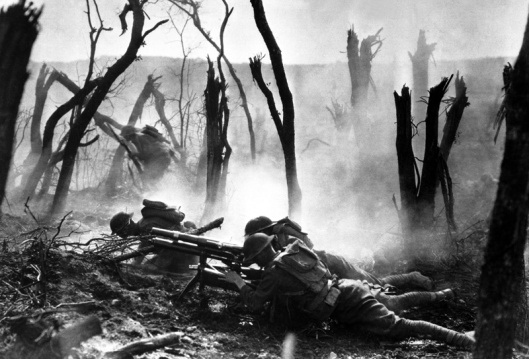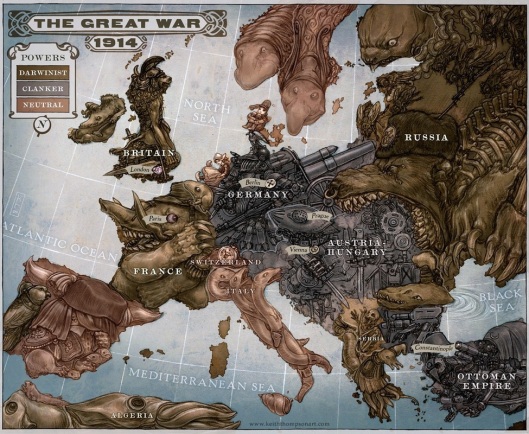As the world congregates to remember the 100th anniversary of the start of the Great War, later known as World War I (1914-18), the root cause of that horrific war remains elusive. The causes of the Great War are complex and extensive, with no one particular reason serving as the all-inclusive culprit. The political situation in Europe in 1914 demands that one looks further back in history than the end of the Franco-Prussian War (1870-71), widely accepted by historians and enthusiasts as the Great War’s “smoking gun”. Indeed, while France’s humiliating defeat in the Franco-Prussian War gave rise to Prussia’s military hegemony over continental Europe (and birth to the German Empire), the origins of this critical event date as far back to the Congress of Vienna in 1814-15, which ended the Napoleonic Wars (1805-15). The Congress of Vienna succeeded in establishing the foundation for enduring peace between nations in post-Napoleonic Europe; a general peace which lasted until the outbreak of the Great War in 1914. Granted, wars did still occur, such as the Crimean War (1852-54), the Seven Weeks War (1866) and the aforementioned Franco-Prussian War, but no continental wide struggle reminiscent of the major wars of the previous two centuries. Thus, Europe endured a long period of “peace”, the longest in its tumultuous history; however, in the 1880s important events would begin to alter the political climate and raise tensions not only in Europe, but throughout the entire world.
A convoluted system of alliances, arms races, and nationalism, and imperialism, traditional, cultural and dynastic rivalries all played a role in the outbreak of the Great War. While the apex of global power still clearly remained in Europe, non-European nations such as Japan and the United States blossomed in strength and prestige. These nations entered the arena of world politics towards the end of the 19th and start of the 20th centuries.
In the late 19th century, European nations developed a series of agreements and defensive alliances aimed to deter general wars. However, as mentioned above these were vague and convoluted, and created a deadly, complex web that threatened to consume Europe if not carefully managed (famously dubbed as “alliance entanglement”). The major agreements and alliances were as follows: the Treaty of London 1839, which guaranteed Belgian neutrality; the Dual Alliance (Germany and Austria) 1879, joined then by Italy in 1882 forming the Triple Alliance; Franco-Russian Alliance of 1894; the “Entente Cordiale” between France and Great Britain in 1904, and the Anglo-Russian entente in 1907 that formed the Triple Entente (Great Britain, France and Russia).
Around the world the Great Powers played a high stakes game of imperialism by preying on smaller, less fortunate nations; however, this led to intense competition. Traditional foes Great Britain and France, as they had in the previous century, dominated the colonial arena. Each of them possessed world-wide empires that generated massive wealth. Spain, in decline but not dead (for the moment) still retained sizeable imperial holdings, as did the Netherlands, Portugal, and Denmark. Newcomers Belgium and Italy carved out empires in Africa, as did the increasingly powerful and dangerous German Empire, which also acquired territory in the Far East. In Europe, the old Habsburg Austro-Hungarian Empire struggled to maintain relevancy and its control over culturally divided lands, as did once powerful Russia, and the “sick man” of Europe, the quasi-medieval Ottoman Empire.
From the late 1870s to 1890s the Great Powers of Europe engaged in a massive military build-up, including an intense naval arms race. In 1898, the United States, Europe’s gaudy adolescent offspring jumped on the world stage when it defeated Spain in the Spanish-American War (1898). After more than three centuries, the colonial empire of Spain-once the largest in the world-finally came to an end. The United States gained former Spanish territories in the Caribbean Sea and Pacific Ocean, the most important being the Philippine Islands. Almost overnight the United States became a world power, but for a time preferred to remain isolated from the burgeoning maelstrom of European politics despite keeping close ties with France and Great Britain (although the naval arms race complicated relations with the latter).
In 1905, Japan, the premier Asiatic military power, inflicted a devastating defeat on the Russians in the Russo-Japanese War. For the first time in history, a Far Eastern nation had beaten a European nation in a one on one conflict. At the decisive naval battle of Tsushima, the Japanese Navy destroyed the combined Russian fleet, which exposed the rampant decay of Russian military prowess to the other Great Powers. Tensions then flared in 1912-13 when Bulgaria, Greece, Montenegro and Serbia achieved independence after centuries of Ottoman rule. The conflict nearly brought Austria-Hungary and Russia into war and thus, activated the continental wide alliance systems; but instead, general peace prevailed, for at least another year.
On June 28, 1914, Serbian-born Yugoslav nationalist Gavrilo Princip assassinated the Archduke Franz Ferdinand of Austria, heir to the Austro-Hungarian Empire and his wife Sofia in Sarajevo. The murder immediately sent shock waves throughout Europe, and proved to be the spark that finally lit the continental aflame. Austria, holding Serbia responsible, declared war and invaded the small Balkan country. Then dreaded alliance systems then activated. France and Russia came to Serbia’s aid and Germany supported her ally Austria. Later Great Britain joined the war once Germany violated Belgium’s neutrality to invade France. Within a year nearly all of Europe, the Middle East and Africa became embroiled in war. The war even spread to the Far East to China, Japan and the South Pacific. In 1917 the United States entered the war. American leaders in the war included President Woodrow Wilson, U.S. Secretary of War Nelson Baker and General John Pershing, commander of the American Expeditionary Force. The Great War, World War I, was significant because it constituted the apex of nineteenth century industrial warfare, changed international politics forever and served to end centuries’ old rivalries and dynastic struggles.
Edmund Carter III


